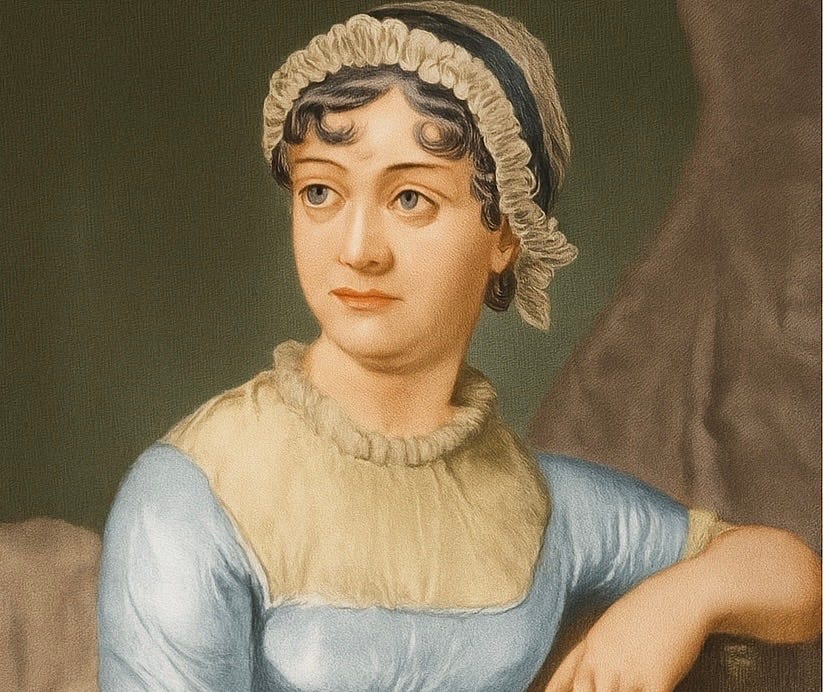Inside Jane Austin’s World
Uncovering the woman behind the novels.
Unpopular opinion: I like the Brontë sisters much more than Jane Austen. There are certainly some of Austen’s books I have fallen in love with, but others I have struggled through to the end.
That said, I greatly admire Jane Austen for changing the landscape of female literature forever. She was also a fascinating person who died far too young. Let us wander through the world that created Pride and Prejudice, Emma, Mansfield Park, and many more.
Pride
Jane Austen was born on 16 December 1775 in Steventon. Her father was a clergyman, always with his head in a book, and her mother cared for the children. They were a respected family, though not a wealthy one. Jane was the seventh of eight children, with six brothers: James, George, Edward, Henry, Francis (Frank), Charles and one sister, Cassandra, to whom she was particularly close.
More than this, they were a family of storytellers and readers. Her mother would invent family tales to entertain guests, while her father encouraged Jane’s education and introduced her to literature from an early age. Jane inherited her sense of humour and storytelling abilities from her mother.
As a child, Austen wrote plays and poems and always created stories. When completed, the family would gather around the fire to listen to her read them aloud. She was just twelve at the time.
Prejudice
Although Austen never married, saying she had never been in love would be wrong. As a young woman, she fell in love with Tom Lefroy. The two were reportedly smitten, but his family sent him away to London to end the relationship.
It is thought that the two sisters in Sense and Sensibility, Elinor and Marianne Dashwood, represent different aspects of Austen’s feelings towards Lefroy.
Know your own happiness. You want nothing but patience — or give it a more fascinating name, call it hope. - Sense and Sensibility
In 1793, she wrote her first adult novel, Lady Susan. The title character is a strong woman who is not swayed by love. This may have been another way for Austen to process her own emotions. It also ran counter to the romantic literature typical of the time, where women swooned at any man who showed an interest in them.
Behind the scenes, her father contacted publishers on her behalf, though none responded favourably.
Sensibility
Tragedy struck in 1805 when her beloved father died. The family had retired to Bath five years earlier, but Austen was said to be deeply unhappy there. This may be reflected in the fact that she completed no novels during her time in the city.
After her father’s death, Austen found herself without a permanent home and financially unstable. She and her mother spent three years moving between the homes of various family members. These experiences mirror the life of Anne Elliot in Persuasion, who also stays with relatives and shares similar feelings about Bath.
In 1809, her brother Edward bought her and her mother a house. With some stability returning, Austen resumed editing her earlier works, including Pride and Prejudice and Sense and Sensibility.
Once finished, her brother Henry helped publish Sense and Sensibility, which was attributed only to “A Lady.” Women of the time were not encouraged to have jobs and especially not to write novels. Austen earned the equivalent of £11,000 in today’s money from its success, giving her financial independence; particularly important as Edward later fell into debt and could no longer support her.
Sense
In 1813, Austen published Pride and Prejudice, a huge success. The book was credited to “The Author of Sense and Sensibility.” In 1814, Mansfield Park followed and was her most financially successful novel, though still published anonymously.
However, in November 1815, a major fan uncovered her identity. That admirer was the Prince Regent, later King George IV. He had purchased a first edition of Sense and Sensibility and was such a fan that Austen dedicated her next novel, Emma, to him.
Not all her publishing experiences were positive. In 1816, a second edition of Mansfield Park sold poorly. Austen had to use her profits from other books to repay the publisher for the unsold copies.
It was around this time that her health began to deteriorate. She grew weaker as she worked to complete Persuasion. By April 1817, she could no longer walk. She died on 18 July 1817 in her sister Cassandra’s arms.
Her brother would later publish both Persuasion and Northanger Abbey posthumously.
There has been much speculation about the cause of her death. Possibilities include Addison’s disease, Hodgkin lymphoma, tuberculosis, or lupus, though no official diagnosis was given at the time.
Legacy
Although Jane Austen’s life was relatively short, her literary achievements have had a lasting impact. Her novels, rich in social commentary and psychological insight, resonate with readers across generations. Each reflects the intricate realities of love, family, and class, often inspired by her life and experiences.
Despite the immense challenges she faced in getting published, Austen persisted. Ultimately, she published six major novels during her lifetime or shortly after, and she even gained a royal admirer.
Her characters, from the sensible Elinor Dashwood to the quietly strong Anne Elliot, remain iconic figures in literature. Austen’s legacy lives on through her writing and the lens she offered into the lives of women and the subtleties of human nature.
Jane Austen may have died in 1817, but her voice continues to speak to generation after generation.
The person, be it gentleman or lady, who has not pleasure in a good novel, must be intolerably stupid. - Northanger Abbey


